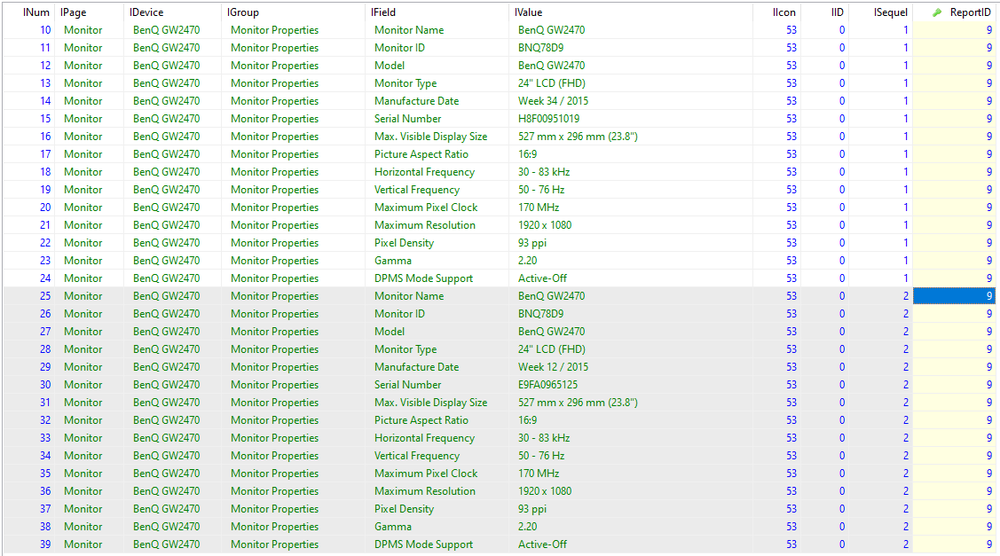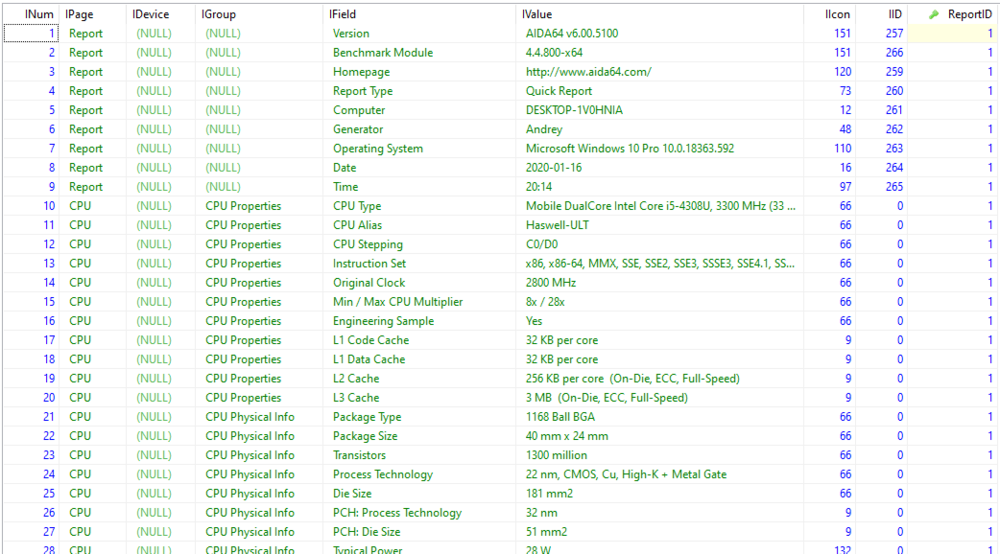
strelkov.av
Members-
Posts
21 -
Joined
-
Last visited
-
Days Won
1
Content Type
Profiles
Forums
Events
Everything posted by strelkov.av
-
Good afternoon, please tell me what is meant by Total DownTime and how it is calculated, do I correctly understand this time in seconds that displays the state of the computer when nothing happens behind it, if so, then from what moment of user inactivity the countdown begins And also what is meant by System Availability?
-
Returning to the old question, your case is basically suitable for implementation, but I noticed that in certain cases, namely in my case with memory modules, this option is not suitable, because it seems that in my network there are computers whose memory modules may not be fully defined, and the reports do not contain the first mandatory field, which I could cling to and on the basis of it consider the script instance In other words, in AIDA reports, in such sections where there are many devices (monitor, memory modules, network cards, etc.), it is not certain that the first field from the ifield column will always be one for all instances. It turns out that there may be a case that the first 2 memory modules are modern and AIDA understands them, and the first field uses their name, and the third module may be some unsupported / old module, AIDA does not define it, the field does not create with the name -> and the script breaks down, and the whole point is lost
-
Good day, tell me please, can I find out from the reports whether there is a password to log in to the BIOS? I need to find out how many computers have password protection enabled when logging in to the BIOS
-
I tested and tried to change the values from /SAFE to /SAFEST, and then completely removed the parameter When I removed the SPD parameter, the section appeared, you were told in the instructions that it is better to set the /SAFE parameter for network audit. Please tell me what the consequences may be if I remove this parameter at all?
-
I use next parameters: \\ad\base\LOGIN\Install\aida64_business600\aida64.exe /R /DATABASE /CUSTOM \\ad\base\LOGIN\Install\aida64_business600\aida64_business600.rpf /SILENT /IDLE /NOICONS /SAFE /LANGRU And my RPF file: InfoPage="Computer;Summary" InfoPage="Computer;DMI" InfoPage="Motherboard;CPU" InfoPage="Motherboard;Motherboard" InfoPage="Motherboard;SPD" InfoPage="Motherboard;Chipset" InfoPage="Display;GPU" InfoPage="Display;Monitor" InfoPage="Multimedia;HD Audio" InfoPage="Storage;Optical Drives" InfoPage="Storage;ATA" InfoPage="Network;Windows Network" InfoPage="Devices;Windows Devices"
-
Good day, we are using version 6.00.5100 AIDA starts automatically when the computer is loaded on behalf of-SYSTEM . We noticed a feature that reports do not have an SPD section in the database, which stores information about memory bars. However, if you run a full-fledged application with admin rights, this section is displayed successfully, and if you use the interface to make a quick report on the motherboard to the database, the SPD section is present in the generated database report It turns out that the problem is that when AIDA is run as SYSTEM when the computer is loaded, this section is skipped in the database for some reason Could you check for this behavior in your office?
-
Good day, please tell me , in our case, AIDA is run by group policies on all enterprise computers, i.e. when the operating system is loaded, IT runs automatically in the background. The problem is that you need to collect statistics on which computers a particular Clickonce application is installed on . But the reports do not include this software. Because it looks like Clickonce applications they are set separately for each user in the system , and AIDA is run on behalf of the system, and therefore it does not see it
-
For clarity, there is a screenshot of my situation at the bottom. I. e. 2 monitors are connected to the computer, absolutely identical-but except for the serial number and release date, and when uploading the report to the database-I can't process this information so that I understand that in the report there are 2 monitors, if they differ in name, then it would still be possible to group them, but not in this case. And this is where it would help a lot to have an additional field Sequel by which I would be able to group, and understand that there are 2 or more pieces. Similar situations are suitable for many other types of information where there are many similar devices
-
Why don't all metrics have an IID in the database?
strelkov.av replied to strelkov.av's topic in General Discussion
It is clear, but if you imagine that you probably have some lists of fields in the program somewhere, i.e. some database of them (which grows every time of course) Can it add some auto-increment to each field, so to say all the current fields are numbered , and when new ones appear, they are given the following numbers. When working with data from the database, there is no numeric field that can be used to index and filter information much faster and more convenient than relying on a text field that can be changed at any time by the language localizer that I use -
Good day! All my reports are placed in the database, but the problem is that I want to make a transposition of information, and from the item table where monitors are described for example, make a table reference for all monitors on computers. That is a unique reference table The problem is that it happens for some reason when two monitors are connected to the computer, but they differ slightly in characteristics (quite a bit, but they are still different) So I get this way I can not distinguish them as they are different monitors. I can determine their uniqueness by a set of values of certain fields, but in this case, as if the item table does not have a column with the number of the monitor instance (like ISequel), so that it was possible to group monitor instances by it
-
It would be great if there was a possibility of filtering events is also additional by Source For example, I do not want to have a list of all event type Information, and want to have the event Source - MsiInstaller type (the type Information), and the Source - Microsoft Windows security auditing (type Audit) And that this Source type selection is not a Checkbox, but just a comma-separated string, for example: MSiInstaller, Microsoft Windows security auditing, Kernel-general, ... and etc.
-
You have a useful option to generate a report based on Windows logs where you can specify how long it takes to display results. However, it is not possible to specify the number of days in the plan, for example, only the last 10,000 entries. In my case, I want to have all records from the MsiInstaller category in the report to log who installed / deleted which application. And everything seems to be fine, I can get it, but let's say that the report was generated when the computer booted, after which the user installed the application-worked in it and deleted it - and then went on vacation for 10 days, so the next time his computer turns on and generates a report, but without this data, because they do not fit in the range of 7 days. So unfortunately I can't find out about the actions taken
-
Good day, I noticed a feature that I can't run the report generation in the database (/DATABASE) in the command line without specifying the /R parameter That seems to be illogical, because I want to enter data in the database, why should I specify a parameter that specifies the local storage of data
-
Good day, you have a good field in the database for storing unique identifiers of different types of report variables. This eliminates filtering by word depending on the language used (and also protects in the future, if developers suddenly want to call the parameter differently) But unfortunately, not all your data has a unique identifier, and it's not even that the less popular categories are devoid of an identifier, but even those like the processor do not have one For example screenshot attached to topic
-
Good afternoon, please add such an indicator as the time spent on generating the report. In my local network, when loading computers ( more than 3000 computers ), automatic report generation is started with uploading to the database, and computers have different characteristics, i.e. they are very weak, or with a large number of files, windows security events, etc. In such cases, there is not enough such a metric as the time spent on generating a report, on the basis of which we could understand where the computer is slowing down and the user is suffering Ideally, I see this as an additional field in the Report table (when uploading to the database)



